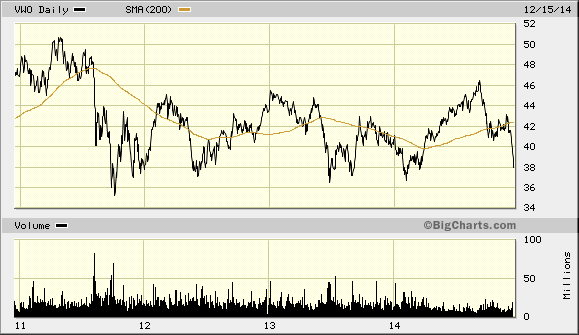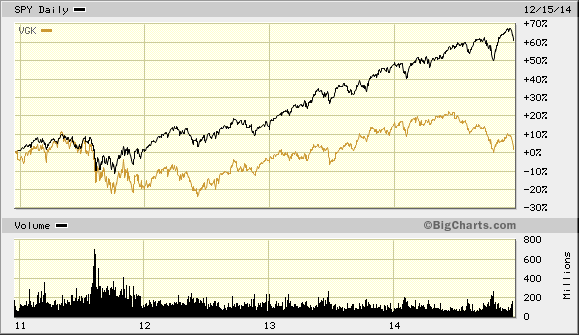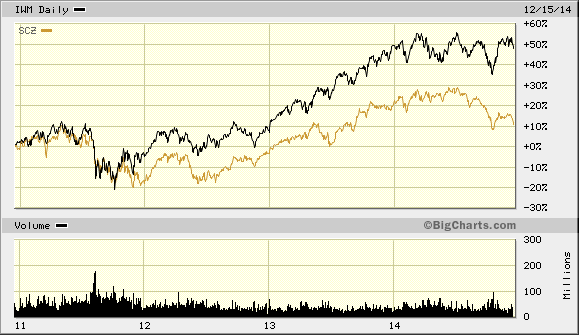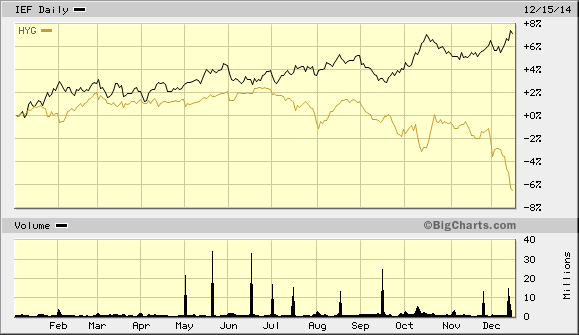It should not be too difficult for investors to remember the financial media’s general recommendation for stock exposure in the previous decade. Based primarily on the enormous success of emerging markets and developed foreign markets – talking heads on CNBC regularly talked about total market cap of world equities being a 50% split between the United States and the rest of the world. Gurus surmised that one should place half of one’s stock exposure overseas.
Over the last four years, of course, this has been a disastrous decision. The move away from 80% U.S/20% international to a 50/50 allocation has been painful for followers of television programs, even readers of writers and listeners of radio show personalities like myself. In my case, however, there is a simple difference. I sell positions early with the help of stop-limit loss orders when they are not working. I do not return to them until they demonstrate verifiable uptrends. For several years now, my stock breakdown has been closer to 90% U.S/10% abroad…if that!
It is not too difficult to see the reason for the shift when we investigate the major equity asset classes. For instance, four years of losses in Vanguard Emerging Markets (ARCA:VWO) would be challenging for a buy-n-holder to accept. (It is one thing to talk about a twenty-five year commitment; it is quite another to experience disappointment month after month, year after year.)

Of course, it is not just the emergers that have struggled. A broad range of European equities in Vanguard Europe (ARCA:VGK) have been utterly flat. Considering the way in which the euro-zone’s sovereign debt bear flared up and subsequently turned dormant, a 0% return may not seem so bad. Yet a 60% return for the S&P 500 SPDR Trust (SPDR S&P 500 (ARCA:SPY)) is a tough pill for global investors to swallow.

It does not get much prettier when you shift to smaller companies either. The iShares MSCI EAFE Small Cap Fund (NYSE:SCZ) underperformed the iShares Russell 2000 Index (ARCA:IWM) by roughly 40 percentage points.

Even if we shorten the time period up to the current year, we can make a number of simple observations:
1. You were disappointed again by your international positions. Unhedged positions in popular ETFs like iShares MSCI Japan (NYSE:EWJ)) and Vanguard FTSE All World ex U.S. (Vanguard FTSE All World x US (NYSE:VEU)) lost money.
2. U.S. large-caps as tracked by the Dow and S&P 500 are maintaining admirable gains on the year. Yet U.S. small caps as tracked by the Russell 2000 are flat through 12/15/2014.
3. High yield corporate bonds have fallen off the proverbial cliff. Granted, most of the decimation in the sector can be attributable to 15%-20% exposure to energy company debt, where rapidly declining oil prices are killing oil producing pure plays. On the other hand, rare is the circumstance where comparable U.S. Treasuries in a fund like iShares 7-10 Year Treasury (ARCA:IEF)) will impressively win the demand game over corporate high yield in a fund like iShares High Yield Bond Fund (ARCA:HYG), especially when signs had been pointing to an economic resurgence in the U.S.

As recently as 2011, the 44th economy in Greece nearly rocked the entire world’s financial system. The explanation? The world is far more interconnected than it has ever been in history. Lately, however, talking heads have been trying to explain how the U.S stock market has avoided three years of corrective activity while Rome (and the whole world) burns. Their conclusion? We are not so dependent on world issues or global economic concerns anymore. After all, they say, we are practically energy independent.
Does this really sound practical? Is the U.S. really an island? Or is the U.S. stock market the primary beneficiary of worldwide central bank stimulus, the yen carry trade and frustrating results in virtually every other asset class? I believe it is the latter.
Commodities, China, energy, basic materials, junk bonds, U.S. small caps, Europe, Brazil, Japan, foreign currencies – they’ve all been losers. That leaves U.S. large company for the money, until that move wears out its welcome too.
I am not bearish on U.S. large caps. Nevertheless, I believe in multi-asset stock hedging and/or a barbell approach for risk-adjusted success. Even if a bear should finally roar, I have plan in place for minimizing the bulk of the downside. I suggest that you make sure that you have a proactive approach for dealing with a bear as well.
Disclosure: Gary Gordon, MS, CFP is the president of Pacific Park Financial, Inc., a Registered Investment Adviser with the SEC. Gary Gordon, Pacific Park Financial, Inc, and/or its clients may hold positions in the ETFs, mutual funds, and/or any investment asset mentioned above. The commentary does not constitute individualized investment advice. The opinions offered herein are not personalized recommendations to buy, sell or hold securities. At times, issuers of exchange-traded products compensate Pacific Park Financial, Inc. or its subsidiaries for advertising at the ETF Expert web site. ETF Expert content is created independently of any advertising relationships.
